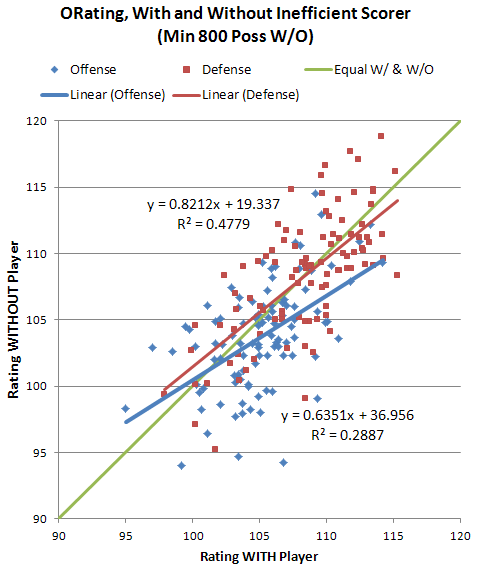Haven't posted here much, for various reasons (chief amongst them, my severe limitations of statistical knowledge) but found this an interesting discussion, sparked by a typically provocative Dave Berri post, posing the question as to what happens to a team when its leading scorer is taken out of the equation. This was sparked by the failure of Denver to collapse when Melo left or Memphis' continued success when Gay went down.
Typically, he used WP to back up his argument, replacing each of the stars with an average player by this much maligned metric. It goes without saying that Berri loathes inefficient volume scorers, so the negative effects of this change were unexpectedly mild for a majority of teams.
This prompted a reply by Neil Paine of BBR, in which he critically examined Berri's proposition by examining the vast game-by-game records of BBR to find out what happaned to individual when a leading scorer went out, which showed a definite (if relaitvely small) drop in ORtg. Although it started out like a "gotcha" expose, in the comments Neil moderated his tone to concede that Berri's not making an absolutely outrageous claim.
So... apart from the ritualised Berri-bashing, I was wondering what people thought on the replaceability of "star" scorers in terms of team offense and the value of an "average" replacements. It's an interesting question.
Berri and Paine on Leading Scorers
Moderator: Doctor MJ
Berri and Paine on Leading Scorers
- rrravenred
- Retired Mod

- Posts: 6,118
- And1: 593
- Joined: Feb 24, 2006
- Location: Pulling at the loose threads of arguments since 2006
Berri and Paine on Leading Scorers
ElGee wrote:You, my friend, have shoved those words into my mouth, which is OK because I'm hungry.
Got fallacy?
Re: Berri and Paine on Leading Scorers
-
DSMok1
- Sophomore
- Posts: 118
- And1: 113
- Joined: Jul 26, 2010
- Location: Maine
- Contact:
-


Re: Berri and Paine on Leading Scorers
I think Berri is correct in that the leading scorers are not necessarily the best players on the team; many varieties of player rating metrics agree on this (including perhaps the current best in the public domain for rating players with significant minutes, RAPM).
What is interesting is determining what a replacement should be. In Neil's analysis, the players were replaced by whomever the coach put in--however the coaches felt to best mitigate the loss of the player. How good were the combinations of replacements? We have no way to know, but it looks like the replacement combinations (other good players playing more minutes, some bench players playing more minutes) may have been around league average. I say that, because I anticipate that the leading scorer is probably somewhere around a +2.5 to +3 (pts/100Poss) player, and the leading scorer probably plays about 75% of the team's minutes--if that's so, then the replacement combinations/patched-together rotations are about +0.
What is interesting is determining what a replacement should be. In Neil's analysis, the players were replaced by whomever the coach put in--however the coaches felt to best mitigate the loss of the player. How good were the combinations of replacements? We have no way to know, but it looks like the replacement combinations (other good players playing more minutes, some bench players playing more minutes) may have been around league average. I say that, because I anticipate that the leading scorer is probably somewhere around a +2.5 to +3 (pts/100Poss) player, and the leading scorer probably plays about 75% of the team's minutes--if that's so, then the replacement combinations/patched-together rotations are about +0.
Re: Berri and Paine on Leading Scorers
- Nivek
- Head Coach
- Posts: 7,406
- And1: 959
- Joined: Sep 29, 2010
- Contact:
-






Re: Berri and Paine on Leading Scorers
Berri's best point (which he repeats virtually every time he writes something) is that scorers are generally overrated by fans, "experts" in the media, and by coaches and front office execs. The general sentiment is that the best scorers are the best players, and that's (of course) not always the case.
One of the best things that will happen to basketball analysis is when scoring and overall playing ability is no long conflated into the same thing. "Scoring" can be just as much of a role as rebounding, defending, ball handling, passing, spot-up shooting -- whatever. The great players are guys who do everything -- Lebron, Magic, Jordan, etc. But, the ability to score doesn't mean that the guy doing the scorer is a better overall player (in terms of impact on the game) than a guy who does little scoring.
There's so much built-in "history" of analysis that says "best scorer = best player" that it's going to take awhile to change the narrative. It may never happen, because it's easy to look at scoring and say -- He must be good.
One of the best things that will happen to basketball analysis is when scoring and overall playing ability is no long conflated into the same thing. "Scoring" can be just as much of a role as rebounding, defending, ball handling, passing, spot-up shooting -- whatever. The great players are guys who do everything -- Lebron, Magic, Jordan, etc. But, the ability to score doesn't mean that the guy doing the scorer is a better overall player (in terms of impact on the game) than a guy who does little scoring.
There's so much built-in "history" of analysis that says "best scorer = best player" that it's going to take awhile to change the narrative. It may never happen, because it's easy to look at scoring and say -- He must be good.
"A lot of what we call talent is the desire to practice."
-- Malcolm Gladwell
Check out my blog about the Wizards, movies, writing, music, TV, sports, and whatever else comes to mind.
-- Malcolm Gladwell
Check out my blog about the Wizards, movies, writing, music, TV, sports, and whatever else comes to mind.
Re: Berri and Paine on Leading Scorers
-
mysticbb
- Banned User
- Posts: 8,205
- And1: 713
- Joined: May 28, 2007
- Contact:
-


Re: Berri and Paine on Leading Scorers
Neil Paine made a follow up post: http://www.basketball-reference.com/blog/?p=9497
His conclusion:
Nice work by Neil which actually shows that the scoring load is not so easily replacable.
I made a comment, because I actually collected some data already on the weekend, but didn't have the time to completely finish it. But that sums up my results so far:
His conclusion:
Losing Your (Inefficient) Leading Scorer Hurts Your Team
As you can see, teams were worse by 1.2 points of efficiency differential when their inefficient leading scorer didn't play, suggesting that scoring, even at below-average rates of efficiency, is difficult to replace. There are a number of alternative hypotheses, of course, so this should not be taken as ironclad, but it is a strong piece of evidence in favor of those who say it is hard to compensate for the loss of any high-usage player.
Nice work by Neil which actually shows that the scoring load is not so easily replacable.
I made a comment, because I actually collected some data already on the weekend, but didn't have the time to completely finish it. But that sums up my results so far:
I identified 57 cases since 2002-03 which I wanted to look into not only by using normal boxscore stats, but also by the +/- numbers provided by 82games.com. Adding the HCA term is really important here, I also added a term for SOS by using the average SRS values for the opponents to make the adjustment for different strong opponents during the stretch with and without the scorer. Overall I come to a similar conclusion as you (granted, I only collected the data for 36 cases so far). The interesting thing is that while the correlation coefficient to the expected point differential (using the Net+/- numbers for the players in games they played to calculate that) is at around 0.7, the teams are playing like 2pts better than expected, but they have still close to 1.5 pts worse point differential than the expected value with the scorer. When I add the more efficient scorers to the mix, the value goes up to 2.5 so far.
So, the overall conclusion is the same. Even replacing the inefficient scorer isn't that easily achievable.
Re: Berri and Paine on Leading Scorers
-
DSMok1
- Sophomore
- Posts: 118
- And1: 113
- Joined: Jul 26, 2010
- Location: Maine
- Contact:
-


Re: Berri and Paine on Leading Scorers
I made a follow-up of Neil's follow-up:

I just graphed the points. Make your own conclusions.

I just graphed the points. Make your own conclusions.
Return to Statistical Analysis

